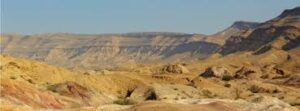Prophecy Against the Negev
The Parable of the Forest Fire
Ezeki’el 20: 45-49
Prophecy against the Negev DIG: What are the three different Hebrew words all translated south? When used symbolically, “fire” commonly refers to an invading enemy, and “forest” refers to a mass of people. What is God saying here? How do you feel about both the green and dry trees burning together? Why does ADONAI do that? Did the hearers of this prophecy heed this warning? Why or why not? How do you think Ezeki’el felt about it?
REFLECT: What was God’s purpose in this warning? In the New Covenant, what is the unquenchable or eternal fire (Luke 3:17; Matthew 25:41)? Do you ignore or concentrate on the bad news God has for our culture? On a scale of one to ten, how well do you accept unpleasant news? How do you react when someone you care about is suffering under God’s discipline? How will you survive YHVH’s “scorched earth” policy?
591 BC during the eleven-year reign of Zedekiah
Some time later, Ezekiel’s long prophecy of 20:1-44 was followed by a short parable.
The one main point of the parable of the forest fire is that Nebuchadnezzar was going to devastate the Negev by the fire of judgment that will spread to engulf all of Judah.
In this near historical prophecy against Judah, Ezeki’el describes Nebuchadnezzar’s invasion. The prophecy extended beyond 591 BC, but the sins and the problems he is speaking of are of that time. The word of ADONAI came to me (Ezeki’el 20:45). In the Hebrew text of Ezeki’el, this verse is the beginning of Chapter 21, where the connection is clear and the figure is explained in direct prophetic language.
Son of man, set your face toward the south (Ezeki’el 20:46a). In verse 46 there are three different Hebrew words all translated south. Here, the word south is teiman, which literally means that which lies on the right hand. On our maps the top of the map is north, but on their maps the top was eastward, so if you are facing east, that which lies on the right hand would be south.
Preach comes from the Hebrew verb nataph and can be translated as drip, drop, or speak, which is translated preach here. To drop a word is used of the message of the prophets. The picture is of a drop of water from a tilted pitcher (Deuteronomy 32:2; Amos 7:16 translated prophesy; Micah 2:6 and 11 translated prophesy). Preach against the south (Ezeki’el 20:46b). The Hebrew word translated south here is darom, which means to emit streams of light.
And drop a word against the forest of the southland (Ezeki’el 20:46c). The Hebrew word for south here is a proper noun, the Negev, specifically referring to the southern part of Isra’el, meaning the dry land (Joshua 15:21). The southland had always been invaded, as far as the Mesopotamian powers were concerned, from the north. The parable of the forest does not relate to Babylon, but to the land of Judah.

But as Ezekiel declared his parable, it quickly became clear to him that his audience did not understand its meaning. They complained that the prophet could only speak in parables, and, though they were not a particularly perceptive audience, the parable should have been clear to them. To speak of a forest fire in the Negev was crazy; everybody knew it as barren land in the south of Y’hudah. Therefore, with God’s permission, Ezekiel explained his parable.295 Say to the Negev forest, “Hear the word of ADONAI. Adonai ELOHIM says, “I will light a fire in you; it will devour every tree in you, green and dry alike, a figure for the righteous and the wicked; a blazing, unquenchable flame that will scorch every face from the Negev to the north.” To everyone who saw the devastating fire its source would be evident, it was God who had kindled the fire that would not be put out (Ezeki’el 20:48).
Whenever the word forest is used symbolically, it always speaks of a mass of people. So the prophecy is not against literal trees, but against the people of the Negev. Any resistance that the Judeans give to the Babylonian army, the unquenchable flame, will be futile. It would touch every life. From Dan in the north to the Negev in the south. What will be judgment for the godless will be refining for the godly. So it was when Babylon invaded the Land for the third time, bringing about the destruction of Judah in 586 BC. No power on earth could hinder the invasion; it was started by God and carried out through Him. Through the messages of Jeremiah and Ezekiel, however, no Israelite could doubt as to who brought about the catastrophe (to see link click Ae – The Problem of Holy War in the TaNaKh).296
Then Ezeki’el said: Oh, Adonai ELOHIM! They complain that I speak only in perplexing parables (Ezeki’el 20:49). Though he was prophesying Judah’s destruction, the exiles were only confused by his words. They were hard-hearted and refused to comprehend his message. There is never enough proof for unbelief.297



Leave A Comment